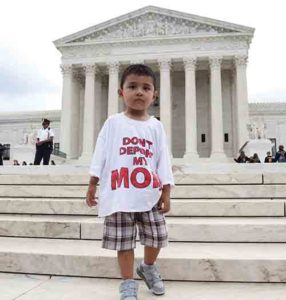WASHINGTON — Catholic advocates say the recent Supreme Court ruling on immigration, while it caused great disappointment, also has spurred many of them to work harder to reform the country’s immigration system and push for better understanding of immigrants.
Sara Benitez, Latino program director for the Washington-based Faith in Public Life, said the ruling caused sadness in the immigrant community as well as among those who advocate for immigrants, particularly Catholic groups. However, it also has pushed many of them to fight even harder for “just and humane treatment” and laws for immigrants and refugees, she said.
On June 23, the Supreme Court handed down a 4-4 vote in United States v. Texas that resulted in affirming a lower court’s ruling blocking the President Barack Obama’s plan to temporarily protect some 4 million people in jeopardy of deportation.

A boy wearing a T-shirt reading “Don’t Deport My Mom” stands outside the U.S. Supreme Court in Washington June 23 after the justices issued a 4-4 ruling on President Barack Obama’s executive actions on immigration. The split decision leaves in place a lower court ruling that blocked Obama’s policies. (CNS photo/Andrew Gombert, EPA)
In 2014, Obama issued executive orders expanding a 2012 program known as Deferred Action for Childhood Arrivals, or DACA, and creating the Deferred Action for Parents of Americans and Lawful Permanent Residents, known, or DAPA. The preisdent’s plan was not asking for amnesty or legal immigration status of any sort.
Ashley Feasley, director of advocacy for the Catholic Legal Immigration Network, said the plan was simply seeking to get a reprieve from deportation and a work permit for a group of people who had been in the country for a long time. Feasley was one of three panelists at a June 29 event hosted by the Initiative on Catholic Social Thought & Public Life at Georgetown University. Advocates like Feasley are looking at what the Supreme Court tie means and what can be done next for those they’re trying to help.
However, some like panelist Antonio Tijerino, president and CEO of the Hispanic Heritage Foundation, questioned the administration of Obama and its actions toward different groups of immigrants. The president’s administration said it was seeking to protect children born in the United States by protecting their parents who did not enter the country legally, but at the same time, it also has been busy deporting children and mothers who have recently arrived in the United States fleeing rising violence in their home countries, Tijerino said. He urged others to accompany those facing their deportation fears until a solution to their legal woes can be found. But he said that as advocates, it’s also important to point out inconsistencies.
“We have to be able to call our leaders out,” he said. “This is an issue of (people) trying to escape with their lives.”
Although the defeat of DAPA and an expansion of DACA is disappointing, why have a different attitude and different actions toward a different group of immigrants, he asked. “I’m confused,” he said, adding that immigration raids have ramped up this summer and are “causing great fear” among immigrants. People are afraid to go to the “doctor, schools, church” because they fear being deported, Tijerino said.
Luis Cardona, who works with immigrants and gang prevention programs in Maryland, said some of the people who recently have arrived in this country are traumatized by having to leave all they have ever known because they fear being killed if they stay in their homeland. And then they come to another country to be chased by officials seeking to send them back into the dangerous situation they were fleeing.
“Take that trauma and compound it with this whole new reality,” he said.
Feasley added that while what the president proposed in the recent case reviewed by the high court offered no legal status, it sought to “make things right” where it could but the administration also is trying to navigate a complicated arena of immigration. She said the recent case regarding DACA/DAPA is not over, but it seems as if it will be difficult to arrive at a resolution before the president leaves office.
“It’s not the end of this case,” she said. “The case will move forward but we’ll see no action during this administration.” She said the administration is at a “crossroads.” News reports say U.S. Attorney General Loretta Lynch is exploring options about whether anything can be done about the high court’s decision.
In the meantime, advocates vowed to keep exploring options, in this administration and in the one that is to come. The best thing to do they said, is to make a personal commitment to accompany those who are suffering and to keep working toward building a country that understands what immigrants face.
Tijerino said some express fear about what will happen to immigrants if a particular presumptive presidential nominee becomes president, but there are plenty of present worries and fears that are the result of deportations that send immigrants back into dangerous environments.
“Where’s the horror over what’s happening right now?” he asked.
